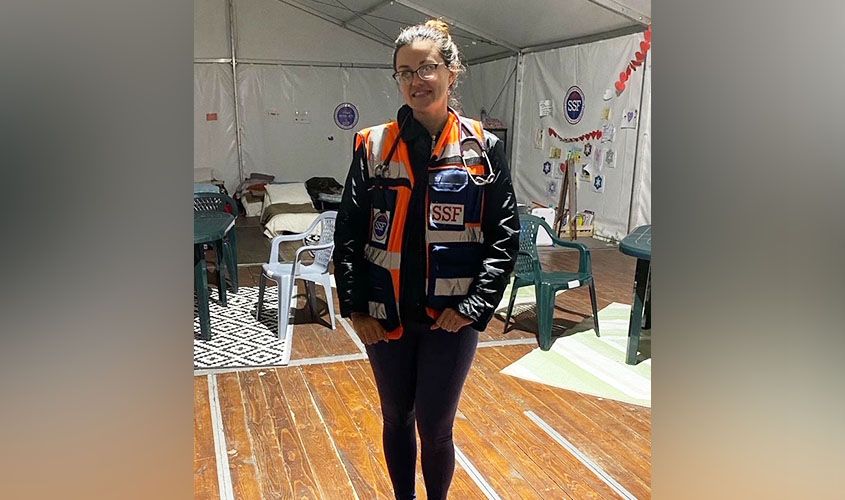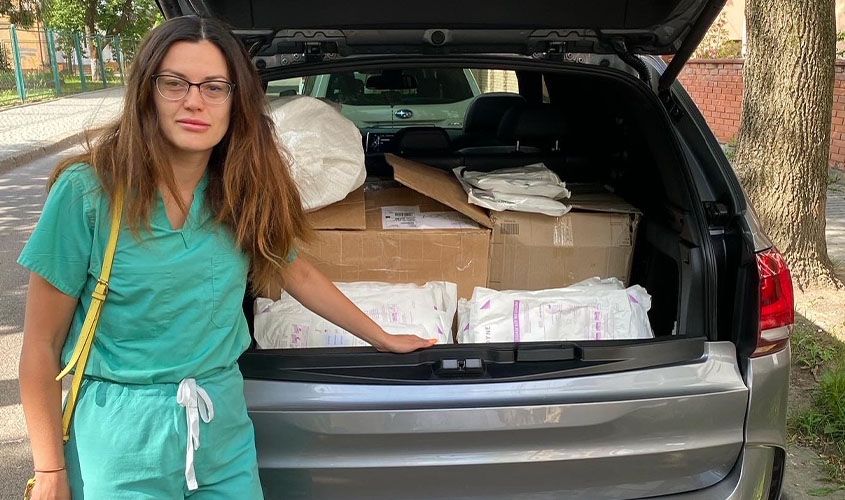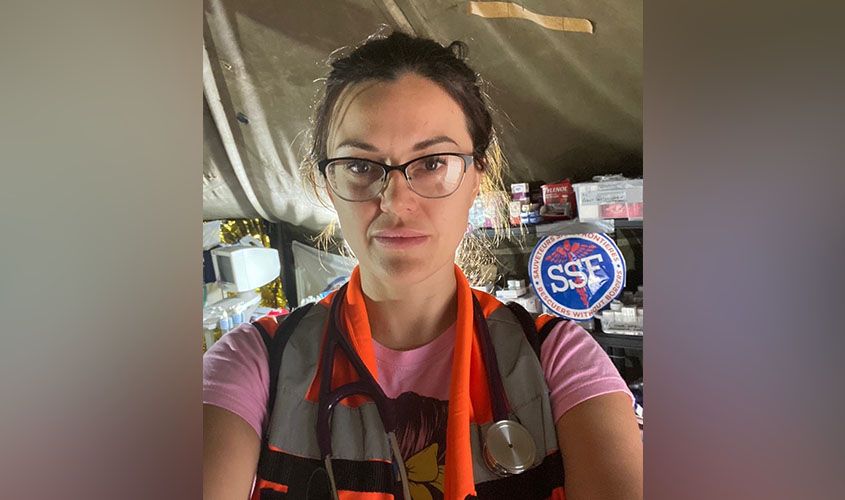Last year, Ukrainian-born Dr. Mariya Vengrenyuk, a 2016 graduate of St. George’s University School of Medicine, felt the calling to help the people of her native country as the war in Ukraine broke out.
In the spring of 2022, Dr. Vengrenyuk, who moved to the US when she was nine, traveled overseas to volunteer for two weeks with two different organizations. She first offered her medical expertise and language skills to help refugees in the Poland-Ukraine border city, Przemysl, by volunteering with the humanitarian group, SSF-Rescuers without Borders. She then traveled to Ivano-Frankivsk, Ukraine—her hometown—to work with Revived Soldiers Ukraine, a group that helps to bring severely wounded soldiers to the US for costly surgeries and other medical treatments pro bono. She continues to work with the group now that she is back in the US.
SGU News recently got back in touch with Dr. Vengrenyuk, who is a travel hospitalist and a clinical investigator, to learn what it was like to treat refugees and soldiers affected by the Russia-Ukraine war and how she was able to use her medical skills in a war zone setting.
SGU: What kind of aid did you provide while you were there?
Dr. Vengrenyuk: At the border clinic, it was mostly urgent care type of treatments—headaches, cough, chest pain, high blood pressure, high blood glucose, mild scrapes/cuts. I was the only Ukrainian-speaking doctor—other doctors were from different countries—so I helped translate and used medical terms for the people crossing the border.
SGU: You previously shared that you needed to mentally prepare for the trip and that, as a doctor, you must be compassionate but not emotional—was that difficult to do in practice?
Dr. Vengrenyuk: I tried to be strong in Ukraine and at the border. But the aftermath hurt me. It continues to hurt to this day. I have dreams about the war and the wounded. When I came back from that trip, I felt depressed. I can’t stop the war. It was not an easy trip for me emotionally because I am still very connected to Ukraine, even though I lived in the US for 23 years. I have family there. When I looked at the faces of the people crossing the border, their despair, pain, I could see my parents in them. And the children’s eyes… they were children, but their eyes showed that they had lived through more than many adults have.

SGU: What were some of the hardest things to see while there?
Dr. Vengrenyuk: The wounded. Many people in Ukraine are missing limbs, eyes, and they have scars and burns on their faces and bodies. It is a whole new generation of people with disabilities.
The most memorable cases are of young men who were blasted on the battlefield and who still have amputations and shrapnel in their body.
[av_button_big label=’SVM Grad Reflects On Ukraine Volunteer Experience: “By Helping People’s Pets, We Were Helping The People”’ description_pos=’below’ icon_select=’no’ icon=’ue800′ font=’entypo-fontello’ link=’manually,https://www.sgu.edu/news-and-events/svm-grad-reflects-on-ukraine-volunteer-experience-by-helping-peoples-pets-we-were-helping-the-people/’ link_target=” title_attr=” color=’custom’ custom_bg=’#1e1e64′ color_hover=’theme-color-highlight’ custom_bg_hover=’#444444′ color_font=’theme-color’ custom_font=’#ffffff’ id=” custom_class=” av_uid=’av-5ppbyim’ admin_preview_bg=”][/av_button_big]
SGU: Were there moments of joy?
Dr. Vengrenyuk: Seeing how many international people are willing to go and volunteer and how quickly the residents joined the volunteering forces. The morale was high, with everyone trying to stay strong.
SGU: What do you think you learned about yourself as a caretaker while volunteering in the Ukraine?
Dr. Vengrenyuk: I think I need more combat military medicine training. My internal medicine skills were useful, but I would like more surgical skills.

SGU: Would you do it again?
Dr. Vengrenyuk: I would do it again. And I would go to other parts of the world. Unfortunately, to do such trips you need to have enough money saved so you can afford to take unpaid leave for one to two months in order to truly make a difference. Taking your vacation time from work is not enough.
I continue to volunteer at home by helping the soldiers we bring to the USA, taking them to their medical appointments, translating medical records, etc.
SGU: What is your advice for physicians who would like to give back on a smaller scale?
Dr. Vengrenyuk: We have enough of a healthcare crisis in the US alone where there is a need. There are homeless shelter clinics, abortion clinics, we have many of our own veterans in the US who are homeless and may have mental disorders, etc. There are ways to volunteer locally, even remotely, via telehealth.
-Laurie Chartorynsky


